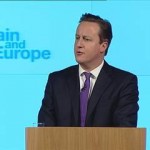Vote Conservative for ‘In-Out’ EU Referendum
 Britons will be able to vote to leave the European Union by the end of 2017 if the Conservatives win the next general election, David Cameron has pledged.
Britons will be able to vote to leave the European Union by the end of 2017 if the Conservatives win the next general election, David Cameron has pledged.
The Prime Minister has promised to negotiate a new settlement with Brussels and then stage a straight in-out referendum on British membership if he stays in power.
In one of the defining speeches of his premiership, he declared, “It is time for the British people to have their say. It is time to settle this European question in British politics.”
He told business chiefs that the Conservative Party manifesto will include a pledge to reach a fresh agreement, to be put to the vote within the first half of a five-year Parliament.
Mr Cameron insisted that he does not want Britain to quit the 27-nation bloc and would “fight with all my heart and soul” for a yes vote when the time comes. But he conceded that public mistrust of the EU is growing and democratic consent is now “wafer thin” because its role has snowballed since the last referendum in the 1970s.
The Prime Minister said, “I never want us to pull up the drawbridge and retreat from the world. I am not a British isolationist but I do want a better deal for Britain.”
Mr Cameron wants a new treaty to reshape the EU, resolve the eurozone crisis, increase the group’s flexibility, accountability and competitiveness and allow the return of powers from Brussels. His “strong preference” is to push through reforms for the whole of the EU but he vowed to negotiate for the UK alone if other member states do not join him.
He continued, “The next Conservative manifesto in 2015 will ask for a mandate from the British people for a Conservative government to negotiate a new settlement with our European partners in the next Parliament. It will be a relationship with the single market at its heart.
“And when we have negotiated that new settlement, we will give the British people a referendum with a very simple in or out choice: to stay in the EU on these new terms or come out altogether. It will be an in-out referendum.
“Legislation will be drafted before the next election and if a Conservative Government is elected we will introduce the enabling legislation immediately and pass it by the end of that year. We will complete this negotiation and hold this referendum within the first half of the next Parliament.”
Mr Cameron rejected claims that he is undermining the British economy by tabling a vote, insisting that an exit was more likely if the issue was ignored.
In a move set to delight many Conservative MPs, he also signalled a referendum would go ahead even if he is forced into a second coalition. “If I am prime minister, this will happen,” he vowed.
Effectively issuing an ultimatum to Brussels, Mr Cameron declared, “The danger is that Europe will fail and the British people will drift towards the exit.”
He called for “fundamental, far-reaching change” as he admitted that the “EU is seen as something that is done to people, rather than acting on their behalf”.
The Prime Minister insisted that now was not the time to make a “momentous decision about the future of our country” because the EU is still reeling from the eurozone crisis. He said Britain’s exit was a question to be approached with “cool heads” and full consideration of whether it was the best move for the country.
He accepted that the scale of his task was vast but declared, “Over the coming weeks, months and years, I will not rest until this debate is won.”
The referendum pledge should help the Conservative Party combat the growing threat from UKIP and many Conservative MPs hope it will be a turning point in the battle to win power in 2015.
Mr Cameron’s speech has been months in the planning, with the delay an indication of the difficult balancing act he is attempting to achieve. It was eventually scheduled to happen in Amsterdam last Friday but was postponed because of the Algerian hostage crisis.

